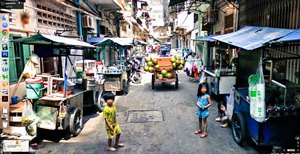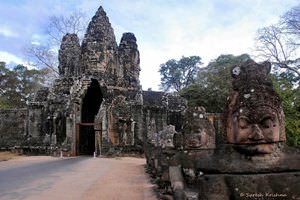
Cambodians are very fond of all kinds of holidays and always celebrate them on a grandiose scale. One of the most popular holidays in Cambodia is the New Year. Lush celebrations on the occasion of the New Year last about three days. On the first day of the festivities, many residents head to churches and religious communities to receive a blessing from monks. According to the local tradition, Cambodians paint water in all colors of the rainbow so that the coming year will be successful. On the second day, it's time for charitable donations, assistance to the poor and needy. Cambodian residents believe that charity helps atone for sins and earn forgiveness. Gifts and small souvenirs are presented to relatives and friends.
Cambodian shopping has a number of distinctive features. There are not so many shops in the modern sense of the word. When planning a shopping tour in …
Read further
The third day of the New Year celebration is marked by a special ritual, which is of great importance for all Cambodians. At the appointed time, Buddha statues are washed by water. According to the Khmer belief, this action guarantees a rich harvest in the coming year. The New Year is celebrated in the country in the middle of spring - from April 14 to 16. People in Cambodia also pay attention to the Chinese New Year, which falls on January 21. Bright performances and national dance shows, folk festivals with traditional songs, colorful parades and various competitions are organized as part of the festivities. Residents of the country celebrate the Chinese New Year with their families and conduct many ancient rituals, so that next year will be happy and successful.
"Vesak" religious festival is celebrated in Cambodia every year, like in other countries of Southeast Asia. It is believed that Buddha himself was born on this important day for all Buddhists. The event falls on May 17. Participants of the festival gather in the hills where they spend the whole night until dawn. The Buddha's flag is raised, traditional hymns are performed. During the sacred time of celebration, one should be especially careful in the actions: you cannot do housework or kill insects - they may bear the souls of ancestors. It is forbidden to eat meat - only vegetarian food is allowed. Animals that are kept in houses are set free in the wild. Many Cambodians come to monks to talk with them, get an advice, and gain wisdom. Copyright www.orangesmile.com
The luxury hotels in Cambodia, deserving attention of the most discerning traveler.
Read further
One of the notable folk celebrations in Cambodia is the National Furrow Day celebrated on May 21. The history of the holiday is rooted in the deep past when big bulls in ancient times were harnessed into wooden plows to pave the first furrow. After that, the animals were fed and given rice vodka. The bulls were offered to choose from several dishes prepared for them, and the choice made could predict whether the year would be fruitful or not. In September, the country celebrates the Festival of the Dead, which plays an important role in the lives of Cambodians. It does not have a strictly fixed date. Usually, the day of remembrance of the dead is declared by monks and religious figures. Residents of cities and villages rush to pagodas to make donations to the gods and spirits of their ancestors. A traditional donation is rice.
![Angkor Thom South Gate Entrance, Siem Reap, Cambodia Angkor Thom South Gate Entrance, Siem Reap, Cambodia]()
In early November, Cambodians celebrate Independence Day. It is reminiscent of the liberation of the country from the French rule. Prior to 1945, Cambodia was a dependent state under the protectorate of France. Today, the country is a member of the UN, actively advocating for its own security and strengthening its positions in the world. In 1958, the Independence Monument symbolizing this big day was erected in Phnom Penh. Many spectacular festivals are regularly held in Cambodia. They should definitely be visited by all guests of the country. In the middle of November, there is the Water Festival. This is a large-scale event beloved by locals and tourists alike.
Cambodia is a country in Southeast Asia, most of which is endless, densely forested plains. Due to frequent rainy seasons, the country's soils are …
Read further
The celebration's grand scale is explained by its connection with a truly unique event when the Mekong River suddenly changes its current and turns the water in the opposite direction. Colorful processions, sports competitions, noisy fun fairs, and other lavish celebrations are organized on the day of the current shift. Cambodians take an active part in festivities, dressing in bright traditional clothes. One of the most spectacular actions of the holiday is boat races. They embody the attempts of the country's inhabitants to pacify the river in order to avoid floods and crop losses.
 Cambodians are very fond of all kinds of holidays and always celebrate them on a grandiose scale. One of the most popular holidays in Cambodia is the New Year. Lush celebrations on the occasion of the New Year last about three days. On the first day of the festivities, many residents head to churches and religious communities to receive a blessing from monks. According to the local tradition, Cambodians paint water in all colors of the rainbow so that the coming year will be successful. On the second day, it's time for charitable donations, assistance to the poor and needy. Cambodian residents believe that charity helps atone for sins and earn forgiveness. Gifts and small souvenirs are presented to relatives and friends.
Cambodians are very fond of all kinds of holidays and always celebrate them on a grandiose scale. One of the most popular holidays in Cambodia is the New Year. Lush celebrations on the occasion of the New Year last about three days. On the first day of the festivities, many residents head to churches and religious communities to receive a blessing from monks. According to the local tradition, Cambodians paint water in all colors of the rainbow so that the coming year will be successful. On the second day, it's time for charitable donations, assistance to the poor and needy. Cambodian residents believe that charity helps atone for sins and earn forgiveness. Gifts and small souvenirs are presented to relatives and friends.
 In early November, Cambodians celebrate Independence Day. It is reminiscent of the liberation of the country from the French rule. Prior to 1945, Cambodia was a dependent state under the protectorate of France. Today, the country is a member of the UN, actively advocating for its own security and strengthening its positions in the world. In 1958, the Independence Monument symbolizing this big day was erected in Phnom Penh. Many spectacular festivals are regularly held in Cambodia. They should definitely be visited by all guests of the country. In the middle of November, there is the Water Festival. This is a large-scale event beloved by locals and tourists alike.
In early November, Cambodians celebrate Independence Day. It is reminiscent of the liberation of the country from the French rule. Prior to 1945, Cambodia was a dependent state under the protectorate of France. Today, the country is a member of the UN, actively advocating for its own security and strengthening its positions in the world. In 1958, the Independence Monument symbolizing this big day was erected in Phnom Penh. Many spectacular festivals are regularly held in Cambodia. They should definitely be visited by all guests of the country. In the middle of November, there is the Water Festival. This is a large-scale event beloved by locals and tourists alike.


